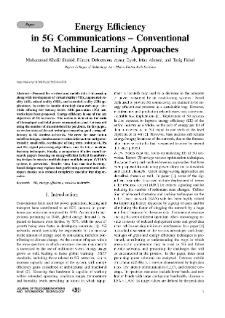Instytut Łączności – Państwowy Instytut Badawczy contains 2 313 digital objects
Object
Title: Energy Efficiency in 5G Communications – Conventional to Machine Learning Approaches, Journal of Telecommunications and Information Technology, 2020, nr 4
Creator:
Shahid, Muhammad Khalil ; Eyob, Aman ; Ahmed, Irfan ; Debretsion, Filmon ; Faisal, Tarig
Date:
Resource Type:
Description:
Publisher:
Instytut Łączności - Państwowy Instytut Badawczy
Format:
Resource Identifier:
ISSN 1509-4553, on-line: ISSN 1899-8852 ; oai:bc.itl.waw.pl:2153
Source:
Journal of Telecommunications and Information Technology
Language:
Rights Management:
Biblioteka Naukowa Instytutu Łączności
Object collections:
- Digital Library > Institute's Publications > Current Publications > Journal of Telecommunications and Information Technology (JTIT)
Last modified:
Apr 23, 2025
In our library since:
Jan 27, 2021
Number of object content hits:
83
All available object's versions:
https://bc.itl.waw.pl/publication/2451
Show description in RDF format:
Show description in OAI-PMH format:
Objects Similar
Bitat, Hiba Ines Maamri, Fouzia Khelfaoui, Fatima Djellab, Hanane Belhocine, Yacine Messai, Yacine
Krawiec Piotr Gajewski Mariusz Sienkiewicz Konrad Mongay Batalla Jordi Wiśniewski Piotr Latoszek Waldemar
Smith, Edward Ugolini, Mauro
Valdar, Andy McCarthy-Ward, Peter Newstead, Stuart Revell, Stuart
Kaur, Parminder Malhotra, Shivani Sharma, Manish
Muhsin, Muhannad Y. Muqdad, Zainab S. Sahar, Asaad H. Mohammad, Zainab F. AL-Saedi, Hussam
Kliks Adrian Musznicki Bartosz Kołodziejski Michał Kowalik Karol Kryszkiewicz Paweł

